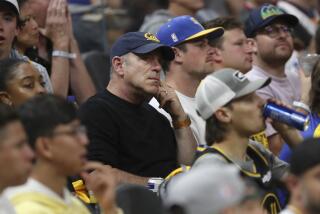Realignment Is Blocked by Cub Vote : National League: Chicago objects to move that would put more of its TV games on later.
- Share via
ROSEMONT, Ill. — A plan to move the Chicago Cubs and the St. Louis Cardinals to the National League West in 1993 and shift Atlanta and Cincinnati to the NL East was blocked Wednesday by the Cubs.
NL President Bill White had pushed for realignment when the league expands to 14 clubs in 1993, but it failed, despite a 10-2 vote in favor.
“We thought it was very important for the Cubs to remain in the East,” said Mark McGuire, a Cubs executive vice president.
The NL constitution requires a 75% vote for realignment, but also requires all clubs involved in switches to approve.
White did not announce the voting, but several others in the meeting said the New York Mets also voted against the proposal.
“I think it was a consensus of the scheduling committee that realignment would be beneficial to the National League,” he said.
The Cubs and Cardinals insisted on being placed in the East when the league expanded to 12 teams and split into divisions for the 1969 season. However, Fred Kuhlmann of the Cardinals said St. Louis voted in favor of the proposal.
McGuire said the Cubs voted no because “our fans were opposed to it.” A move to the West would have resulted in more games with 9:30 Central Time starts on television and a decrease in the number of games against divisional rivals. The Tribune Co., which owns the Cubs, was opposed to a move that would take additional games out of prime-time television.
White must now decide on the format of the NL schedule in 1993. Currently, teams play 18 games against divisional rivals and 12 against opponents in the other division.
Three options are being considered: a balanced schedule in which teams play 13 games in their division and 12 games out; 20 games against division teams and six outside and 18 games in the division and eight outside for a 164-game schedule.
More to Read
Go beyond the scoreboard
Get the latest on L.A.'s teams in the daily Sports Report newsletter.
You may occasionally receive promotional content from the Los Angeles Times.










